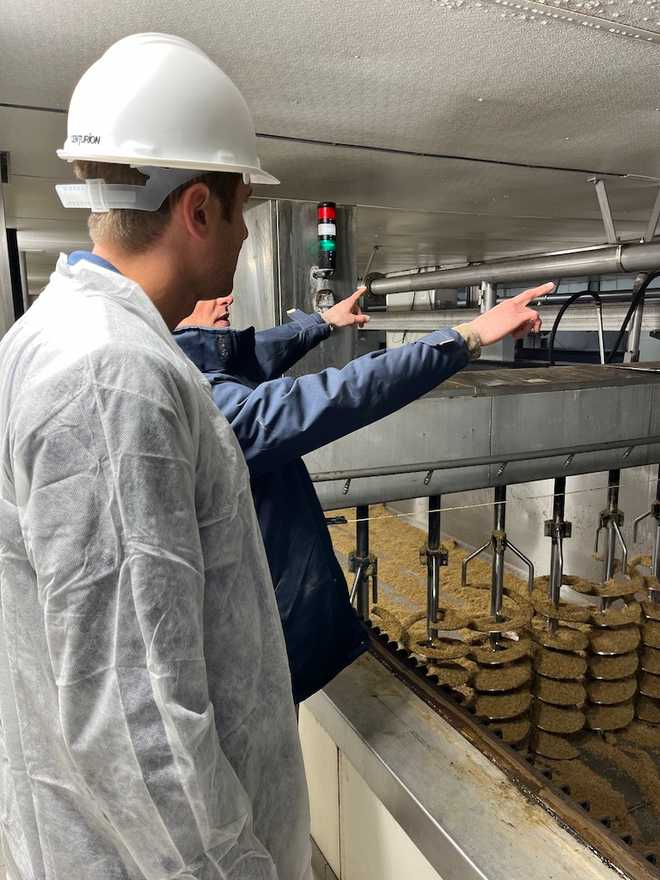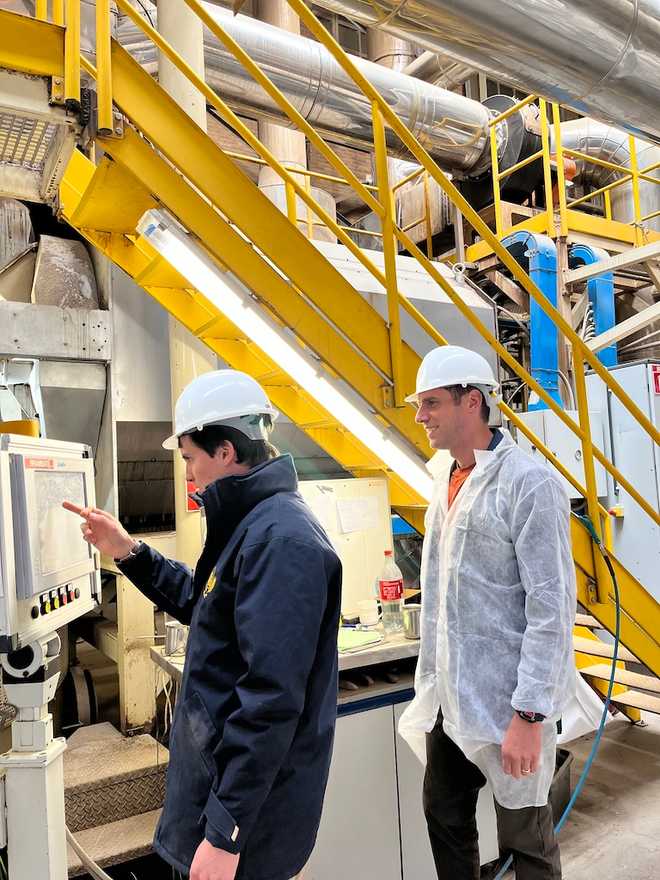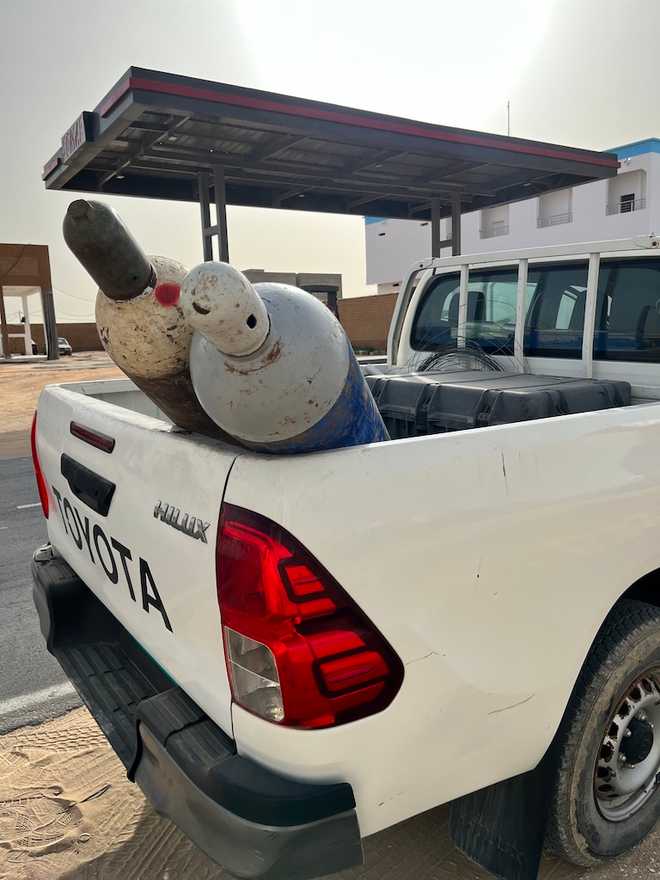Starting a Brewery: A Clip Show

When popular sitcoms need to power through writer staff holiday breaks (or strikes), they often pick up what hit the cutting room floor and turn it all into a clip show. While Lost Nomad isn’t taking a break, there are enough omitted details about starting the brewery in a weird location over the last six months that I thought I should combine it into a journal entry here. Unless you’re starting a brewery on Mars, there probably won’t be many lessons to take away; rather, these are the kinds of things to laugh about at the end of a brew day as you look back on how you got where you are. Regardless of your situation as a start-up brewery, you just have to embrace the fact that everything is simple and the simplest things are (often) difficult.
Grain: Online Shopper to Certified Importer
Procuring malted grain in the Sahara is exactly as difficult as it sounds. My first (naive) plan was to drive to a neighboring country that has a couple breweries, strike up a deal with the brewers, and piggyback on their grain shipments with my low-volume needs. I managed to strike up a conversation with only one of the brewery owners, and that particular brewery produced beer in Belgium and shipped the packaged products down from Antwerp.
Okay, I thought, maybe I can get my own grain on that same boat. Literally the first Google search result for “malted grain Belgium” was Castle Malting, and their online ordering was so easy I didn’t think it was really going to ship–like I’d get a pop up at checkout prompting for my magic brewery credentials to be able to order in bulk. Well that was sort of right. I was able to order and wire the funds internationally, but actually meeting the requirements to import literal tons of grain was where things got interesting. God bless the Castle Malt distribution team and their patience as I asked things like “what is a phytosanitary certificate” and “do you think I can avoid paying VAT since grain is an essential good in this country?” In the end, I became a certified importer recognized by the local government, the Castle Malt folks generated all the paperwork I needed, and I waited a few months for the grain to arrive.
Fast forward to me out of town and my wife standing on the sidewalk outside the American Embassy with an envelope of cash. A car pulls up with the guy inside who is going to help my grain “clear port” and ensure it’s delivered to the brewery–oh, and he’ll email a receipt. Grain actually does arrive on time (ish), though I’m still waiting on that receipt. I can only imagine what the line item would be.
I think they have a sweet tooth
Note: we do give the spent grain to local goats and mules who otherwise subsist on a diet of cardboard and the occasional green plant. To avoid having a herd of animals permanently stationed outside the brewery, I ask the local folks to take the grain away to their animals–please don’t bring the animals to us.
Getting an overview of the germination bay
Second side note: we traveled up to Belgium for the Zythos Beer Festival this year and, since we were only about an hour away from the malt house, we decided to reach out to Castle Malting for a visit. They were exceedingly generous with their time, and their head of R&D spent the entire morning with us walking through their facility. It was an incredible experience and I’m humbled at the craftwork that goes into malting grain–it gave me a renewed appreciation for both maltsters and wine makers who are able to navigate the variables nature throws at them every year.
I backed away and Google Translated 'I didn't touch anything I swear'
Most of all, what resonated with me was their exclusive focus on specialty malts and doing things (well) that don’t scale. Oh and apparently hydromashing is a thing and I need to know more about it.
A Gas Problem
Not surprisingly, movers don’t love to ship canisters of Co2 and O2. Like my well thought out plan above, I figured I could procure gas locally given the popularity of welding shops in the country. While that turned out to be true, knowing who to talk to in order to find a welding supply company turned out to be tricker. Each welder knew where they last got their gas; however, oftentimes the supplier couldn’t procure anything less than a truckload of gas or the supplier itself had just gone out of business entirely by the time I contacted them.
A friend of ours, a local to the area, took it on a personal mission to find a gas supplier. His secret to success? Drive around and follow the first donkey cart he sees with a couple gas containers in the back–they’re either getting a resupply or coming back from one and he could ask them where they went. He followed them to a shop near the hospital (which, thinking back makes sense…file that away for the future), and we hit pay dirt.
There's a non-zero chance these explode in the brewery
The shop sold Co2 and O2…right alongside Argon and Ammonium (unmarked) gas tanks. I’ve been out of Chemistry for a couple years but I do know Co2 and O2 are needed for beer and Ammonium, aside from it probably producing undesirable flavors, will kill a person pretty quickly and violently. We probably asked a dozen times “you’re sure this is Co2,” and loaded the tanks in the back of a pickup truck. It took three of us to move the Co2 and I think it’s on the order of an 800 lb tank. Admittedly, the most difficult part was keeping calm as the three of us drove back towards the vicinity of the American Embassy with two massive gas tanks in the back of the model of pickup favored by ISIS.
1000 lbs of compressed gas, nothing to see here
We moved the massive tanks into the brewery (where I learned European threading on the valves is different than in the USA) and vowed, or prayed, to not touch them for years. I still have nightmares about a gas leak that requires us to do that again.
Junk Drawer of Joy
Then there are the zillion random things that come up and keep you on your toes.
- Many Point of Sale (POS) terminals don’t function overseas. This is enforced with GPS and wifi geolocation. I don’t want to be a cash-only brewery in a foreign currency. Naturally the solution is to disable wifi and transmit a low power GPS signal so I can accept credit cards (or use a QR code and a landing page that accepts electronic payments).
- 30 amp circuits require special electrical connections and potentially an adapter to make it work. These connectors are not the same (and they aren’t European connectors either), not in this part of the world anyway. A few hundred dollars later and a small package arrives in the country via FedEx Worldwide five days later…which is then promptly held at customs as a high value item based on the $50 packing list. Another $125 to “clear customs” and I now likely possess the most expensive 30 amp socket on the continent.
- Hop water kegs get emptied faster than beer kegs. There’s a lesson in there somewhere…and my experience making hop water will be the topic of a future post. My Local Nomads were all skeptical until they tried it; now I can’t make it fast enough.
- Buy at least one more fermenter than you think you need, ideally of a different size than your primary fermenter(s). Demand is a thing, particularly when you’re starting with zero inventory and your customers are knocking on your doors. The Lost Nomad concept hinges on variety, and different vessels of varying sizes are critical to the side-by-side comparisons.
We only just started in January and we’ve already learned several lessons in the process and gathered valuable feedback from customers. I think being in an austere environment sort of limits the number of visits the good idea fairy makes and the feedback we’ve received is primarily focused on how the overall concept resonates or how to enhance experiences in the tap room (like unique events, additional comparisons, and even interior design ideas).
We’re grateful for the ability to launch a concept fast and iterate on feedback at such an early stage for the brewery. Better, we’re having a blast doing it–we hope the Local Nomads enjoy the beer, we brewed it for them.
